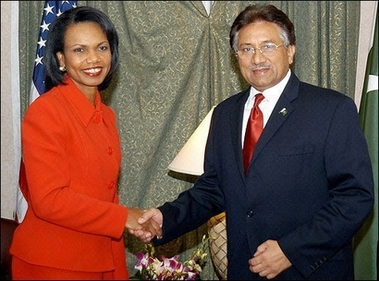WASHINGTON - Pakistan's President Pervez Musharraf, still a valued US
partner, visits the White House Friday after jarring the key anti-terror
alliance by publicly critiquing US strategy.
President George W. Bush and his guest are likely to put on a united front
for the cameras with a joint press conference.

US Secretary of State Condoleezza Rice (L) shakes hands with
Pakistani President Pervez Musharraf prior to a meeting in New York.
Musharraf, still a valued US partner, visits the White House Friday after
jarring the key anti-terror alliance by publicly critiquing US
strategy.[AFP] |
But their statements in the run-up to the talks hint that some bracing
conversations may be in store in private.
Musharraf has been a key player in the US "war on terror" since he ceded to
heavy US persuasion after the September 11 attacks and renounced Pakistan's ties
to the Taliban, which had harbored Al-Qaeda kingpin Osama bin Laden.
But Pakistan's role has come under increasing scrutiny in recent weeks,
partly fuelled by fresh suggestions bin Laden is hiding somewhere in the
otherwise inhospitable mountains of the Pakistan-Afghan border.
There has also been concern about spats between Afghanistan and Pakistan over
claims Taliban militants use Pakistani territory to launch attacks on NATO and
Afghan troops.
The White House talks were leant added spice on Wednesday, when Bush and
Musharraf disagreed publicly about the hunt for bin Laden.
Bush was asked in a CNN interview whether he would send US troops into
Pakistan if he knew bin Laden and Al-Qaeda sidekicks were there.
"Absolutely ... we would take the action necessary to bring them to justice,"
Bush said.
But Musharraf, asked about Bush's comments at the United Nations, rejected
the idea that restrictions on the use of US troops in Pakistan could be lifted.
"We will like to do that on our own," Musharraf told reporters in New York,
on the sidelines of the UN General Assembly meetings."
"We will do it ourselves. We will like to do it ourselves," he said.
On Thursday the White House declined to say whether it would need to ask
permission from Pakistan before striking at bin Laden were he located in
Pakistani territory.
"What I can tell you is that -- without getting into any operational details
-- that when there is actionable information, that Osama bin Laden will be
brought to justice," spokeswoman Dana Perino told reporters.
Asked whether Bush would consider it necessary, Perino noted the pending
visit and added: "As we've said before, Pakistan is an important partner in the
war on terror and a friend to the United States.
"We've had excellent cooperation in many areas, including counterterrorism.
And the president has repeatedly said how much he appreciates Musharraf's
commitment to pursuing Al-Qaeda and continuing to work with us in cooperation in
the search for Osama bin Laden.
"Pakistan and the United States remain close allies, working not only on the
war on terror together, but on many other areas," she said.
In a September 15 press conference, Bush had said that such military action
would hinge on permission from Pakistan.
"Pakistan is a sovereign nation. In order for us to send thousands of troops
into a sovereign nation, we've got to be invited by the government of Pakistan,"
he said in the White House Rose Garden.
Musharraf took another tack away from US policy at a forum hosted by former
US president Bill Clinton in New York.
As NATO pleads for more troops to fight a stronger-than expected Taliban
offensive in southern Afghanistan -- Musharraf blamed the very presence of
foreign soldiers for the upsurge in fighting and terror-style attacks.
"They are coming back because the presence of foreign troops ... there
certainly is an antipathy to foreign presence in Afghanistan," Musharraf was
quoted as saying by the New York Times.
Musharraf also provided the most complete account yet of an encounter between
his intelligence chief and combative former deputy secretary of state Richard
Armitage after September 11.
"The intelligence director told me that (Armitage) said, 'Be prepared to be
bombed. Be prepared to go back to the Stone Age'," Musharraf said in an
interview with the CBS show "60 Minutes," according to selected excepts.
"I think it was a very rude remark," Musharraf said in the interview due to
be broadcast Sunday.
There has also been concern here over a truce signed between the Pakistani
government and tribal elders in the mountainous Waziristan region, which critics
say could make the region a refuge for fugitive Al-Qaeda fighters.
General James Jones, supreme commander of allied forces Europe, said Thursday
the system -- which bars the presence of foreign fighters -- could work, if
properly applied.
But Democratic Senator Joseph Biden warned "the government of Pakistan turns
a blind eye to the Taliban high command based in Quetta, and just this month
signed a 'separate peace' with pro-Taliban militias in Waziristan."
Despite signs of differences, Islamabad still enjoys credit in the US capital
for its anti-terror policies.
"This isn't about pointing fingers at one another," said State Department
deputy spokesman Tom Casey Thursday, referring to the arguments between Pakistan
and Afghanistan over alleged border incursions.
"We very much appreciate the efforts the Pakistan government is making to
combat terrorism. They're a strong partner with us."
Pakistan has arrested several top Al-Qaeda members including alleged
September 11 mastermind Khalid Sheikh Mohammad.
It has deployed around 80,000 troops on the Afghan border to hunt pro-Taliban
and Al-Qaeda linked militants who fled the US-led invasion of
Afghanistan.